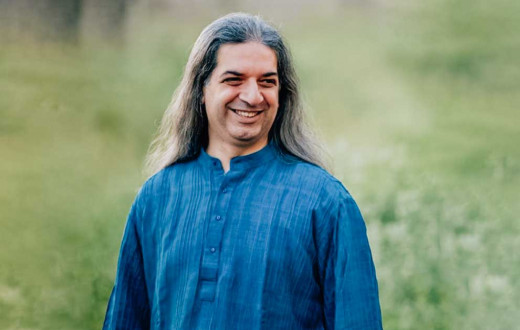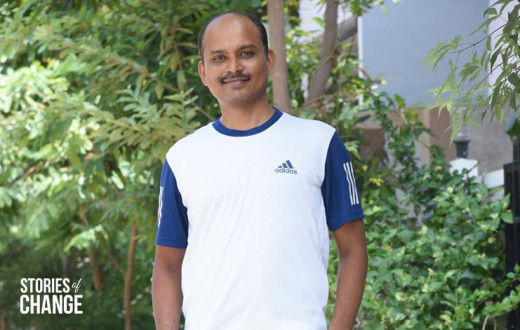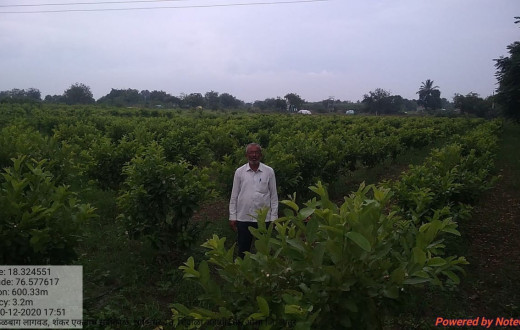
Youssef Majed has survived two civil wars, a bullet in the head, bankruptcy and deaths in the family. Shot in his head at the age of 17, Youssef Majed pulled through but lost all mobility in his legs. He’s bound by a wheelchair, but you’ll never meet a freer man. While millions are evacuating Syria, this man is making inroads into the center of the storm to spread happiness to its war-ravaged people. As faculty with The Art of Living, he is going to some of the most devastated regions of Syria, teaching them yoga and breathing techniques for trauma management and stress relief.
In a candid interview with The Art of Living, Majed shares his fascinating life story, right before he sets off on his next mission to Southern Syria for a ten-day tour.
The path opens up
It was in 2000 that I first did The Art of Living Happiness Program. That was actually a very hard time for me. I had lost three members of my family within a year, and although I’d seen a lot of war, this was a big blow for me. I was nearly bankrupt. I had to take care of my two daughters and I had no idea how I was going to manage. I could barely sleep at night.
I met Philip at a friend’s house. He asked me to learn the Sudarshan Kriya, so I thought I'd give it a try. After some breathing exercises on the first day, I went home and slept like a baby. I was running to go to the center on the second day. I was so happy after Sudarshan Kriya that I went and hugged everyone in the program. For three years it seemed like I was living with a dark cloud. I couldn’t feel love or happiness. I could feel love again. And that was really the starting point for what I’m able to do now in my life.
For a long time in my life I was absolutely resentful. I would repeatedly ask ‘why me,’ why do I have to face all this? It’s been so rough for me.’ But when I was training to be a teacher with The Art of Living, we did this one process and I saw my whole life flash in front of me. In that moment I understood that I had to go through all of that in order for me to be here now, to do what I must do now. My path opened itself for me, and I knew that Gurudev Sri Sri Ravi Shankar was the one who was going to guide me on this path.
On why he risks his life to go into a country that everyone else is rushing to get out of.
So many have asked me about this. My family, friends, and Syrians themselves ask why I’m there. And I have no concrete explanation to give, except that there’s something deep inside me, telling me that I need to be there. I just know that it’s my time to go there. You know, after one of my courses in Damascus, this one lady came to me and said, “Thank God you came. If you hadn’t given me this experience I was going to commit suicide.” Her husband and father have been missing for more than a year now and she has seen quite a lot of violence in her neighbourhood. I have to go for all of these people.
I think I’ve always been like this. It’s in my nature to help people. I was barely in my teens when the civil war broke out in Lebanon. But even then I was a volunteer in my area helping all the injured people.
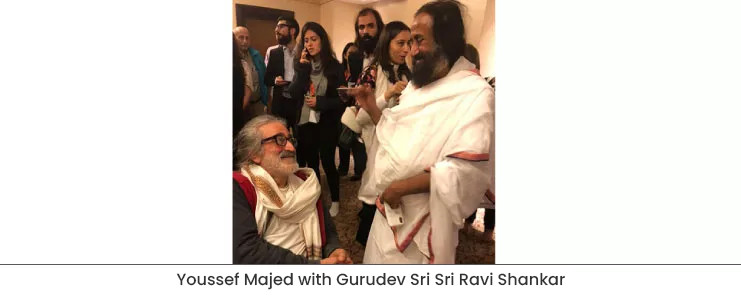
Learn Sudarshan Kriya, a powerful breathing technique that helps our volunteers stay calm and unperturbed amidst the most challenging situations.
Gurudev once said, “I don’t want you to talk about me. I want you to return happiness to the hearts of people. See that they’re all smiling.” I’ll never forget this. I worked in Lebanese prisons when I first became an Art of Living teacher. After an eight-day program, an inmate told me, “I feel more free than I’ve ever felt when I was outside the prison.” Isn’t that a wonderful feeling for a prisoner?
I always call Gurudev before I leave for Syria. I tell him, ‘Gurudev, I’m planning to go to Syria. Should I go?’ He always says, ‘Go! Go now!’ That’s it. That gives me all the strength I need.
On his experiences of teaching in the midst of all the destruction
Sometimes in the middle of courses, we can hear bombings happen nearby. The building we’re in starts shaking. I can see that people are very frightened. But I immediately ask my participants to take their attention to their breath, and that calms them down. Many people fall in love with the workshops. They’re able to feel happiness and love despite being in such a situation. Many of them are now more accepting of the situation they’re in.
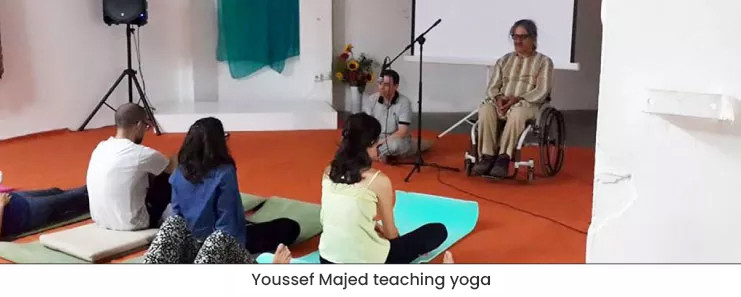
I organised the first Art of Living workshop in 2012 in Tartous, to the north of Syria. There were only six people then. I told them that I’ll come back in two weeks to take another workshop if they gather more people. Within those two weeks, explosions killed 600 people in that small area. They had lost everything. No hospitals, no roads, no buildings. Despite many warnings that it might still be dangerous to go there, I went back. And this time nearly 60 people showed up. By the end of three days, there was so much happiness. I took their pictures and sent them to all those who had warned me not to go back. It’s definitely worth it to see those beautiful smiles on their faces.
Many times people ask me why is it that I do this when I don’t make any money out of it? All I can say is, when you’ve experienced what I’ve experienced, you’ll know. I can’t explain it, but it’s the most wonderful feeling, like I’m in the right place doing the right thing. When I’m taking these programs in Syria, I don’t experience hunger or thirst! I have barely five minutes for a bathroom break in the entire day and I can keep going!
He has some life advice for the rest of us!
The secret behind a good life is to be able to live with the purity of children, the courage of young people and the wisdom of the old. That’s how I can connect with everyone, no matter where they’re from!
If you’ve still got a problem, you should go into the kitchen. Play with the smells and the textures and the colors. It’ll bring you into the present moment. In fact, cooking is my meditation. It gives me so much peace. I feel so alive when I’m in the kitchen. That’s where I send all my students when they come complaining about something.
On how he wants to be remembered
You know there are so many great saints and thinkers from this region. Have you heard of Rumi? Khalil Gibran? Shams Tabrizi? Here’s my favourite quote from Tabrizi’s 40 rules of love: “Intellect and love are made of different materials. Intellect ties people in knots and risks nothing, but love dissolves all tangles and risks everything.” Every time you come across Shams Tabrizi, I want you to think of me.
As told to Samhitha Gomatam

